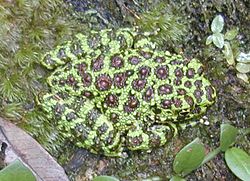Ranidae

Bicolored Frog (Clinotarsus curtipes), is one of many "true frogs" family.
The Ranidae or true frogs can be found in most countries except Antarctica. The true frogs can be found in North America, northern South America, Europe, Asia, Madagascar, Africa, East Indies, New Guinea, and Australia. The bullfrog is the largest true frog in North America. Usually, true frogs are smooth, moist-skinned frogs, with large, powerful legs and have webbed feet. The smallest true frogs are the Wood frog (Rana sylvatica). The largest is the Goliath frog (Conraua goliath). True frogs are semi-aquatic frogs. They live near water.
Subfamilies
Subfamilies included under Ranidae are the following. Some are sometimes treated as separate families:
- Ceratobatrachinae (Malaysia, Philippines, Borneo, Papua New Guinea, Bismarck Archipelago)
- Conrauinae (Africa)
- Dicroglossinae
- Micrixalinae (India)
- Nyctibatrachinae (Western Ghats, India; Sri Lanka)
- Petropedetinae (Africa)
- Ptychadeninae (mainly Africa)
- Raninae
- Ranixalinae (India)
Genera
- Afrana
- Allopaa Ohler & Dubois, 2006
- Amietia
- Amolops
- Anhydrophryne
- Arthroleptella
- Arthroleptides
- Aubria
- Babina (sometimes included in Rana)
- Batrachylodes
- Cacosternum
- Ceratobatrachus
- Chaparana
- Chrysopaa Ohler & Dubois, 2006
- Clinotarsus Mivart 1869 (formerly in Rana, includes Nasirana)
- Conraua
- Dimorphognathus
- Discodeles
- Ericabatrachus
- Euphlyctis
- Fejervarya (formerly in Rana, paraphyletic)
- Fagayman
- Glandirana (formerly in Rana)
- Hildebrandtia
- Hoplobatrachus
- Huia (polyphyletic)
- Humerana Dubois, 1992 (four species)
- Hylarana Tschudi 1838 (formerly in Rana)
- Indirana
- Ingerana
- Lankanectes
- Lanzarana
- Limnonectes
- Meristogenys (might belong in Huia)
- Micrixalus
- Microbatrachella
- Minervarya
- Nannophrys
- Nanorana
- Natalobatrachus
- Nothophryne
- Nyctibatrachus
- Occidozyga
- Odorrana (formerly in Rana)
- Paa
- Palmatorappia
- Pelophylax Fitzinger 1843 (formerly in Rana, probably paraphyletic)
- Petropedetes
- Phrynobatrachus
- Phrynodon
- Platymantis
- Pseudoamolops
- Poyntonia
- Pterorana
- Ptychadena
- Pyxicephalus
- Rana
- Sanguirana (formerly in Rana)
- Sphaerotheca
- Staurois
- Strongylopus
- Sylvirana
- Tomopterna
Books
| Wikimedia Commons has media related to Lua error in Module:Commons_link at line 62: attempt to index field 'wikibase' (a nil value).. |
| Wikispecies has information on: Ranidae. |
- Cai, Hong-xia; Che, Jing, Pang, Jun-feng; Zhao, Er-mi & Zhang, Ya-ping (2007): Paraphyly of Chinese Amolops (Anura, Ranidae) and phylogenetic position of the rare Chinese frog, Amolops tormotus. Zootaxa 1531: 49–55. PDF fulltext Archived 2010-02-03 at the Wayback Machine
- Cogger, H.G.; Zweifel, R.G. & Kirschner, D. (2004): Encyclopedia of Reptiles & Amphibians (2nd ed.). Fog City Press. ISBN 978-1-877019-69-2
- Frost, Darrel R. (2006): Amphibian Species of the World Version 3 - Petropedetidae Noble, 1931. American Museum of Natural History, New York, USA. Retrieved 2006-AUG-05.
- Frost, Darrel R. et al. (2006): The amphibian tree of life. Bulletin of the American Museum of Natural History. Number 297. New York.
- Gordon, Malcolm S.; Schmidt-Nielsen, Knut & Kelly, Hamilton M. (1961): Osmotic Regulation in the Crab-Eating Frog (Rana cancrivora). J. Exp. Biol. 38(3): 659–678. PDF fulltext
- Hillis, D.M. (2007) Constraints in naming parts of the Tree of Life. Molecular Phylogenetics and Evolution 42(2): 331–338. PDF fulltext Archived 2011-09-27 at the Wayback Machine
- Hillis, D.M. & Wilcox, T.P. (2005): Phylogeny of the New World true frogs (Rana). Mol. Phylogenet. Evol. 34(2): 299–314. PDF fulltext Archived 2008-05-28 at the Wayback Machine
- Kotaki, Manabu; Kurabayashi, Atsushi; Matsui, Masafumi; Khonsue, Wichase; Djong, Tjong Hon; Tandon, Manuj & Sumida, Masayuki (2008): Genetic Divergences and Phylogenetic Relationships Among the Fejervarya limnocharis Complex in Thailand and Neighboring Countries Revealed by Mitochondrial and Nuclear Genes. Zoological Science 25(4): 381–390. (HTML abstract)
- Pauly, Greg B., Hillis, David M. & Cannatella, David C. (2009): Taxonomic freedom and the role of official lists of species names. Herpetologica 65: 115-128. PDF fulltext Archived 2011-07-26 at the Wayback Machine
- Stuart, Bryan L. (2008): The phylogenetic problem of Huia (Amphibia: Ranidae). Molecular Phylogenetics and Evolution 46(1): 49-60. PDF fulltext Archived 2016-03-03 at the Wayback Machine
Ranidae Media
Ishikawa's frog (Odorrana ishikawae)
